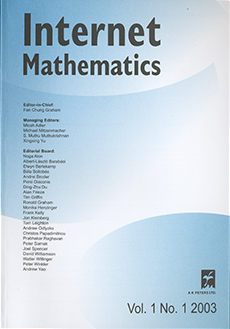Abstract
We suppose we are given some fixed (but unknown) subset X of a set $\Omega = {\mathbb F}_2^n$, where ${\mathbb F}_2$ denotes the field of two elements. Our goal is to learn as much as possible about the elements of X by asking certain binary questions. Each "question" Q is just some element of $\Omega$, and the "answer" to Q is just the inner product $Q \cdot x \in {\mathbb F}_2$ for some $x \in X$. However, the choice of x is made by a truthful (but possibly malevolent) adversary A, whom we may assume is trying to choose answers so as to yield as little information as possible about X. In this note, we investigate several aspects of this problem. In particular, we are interested in extracting as much information as possible about X from A's answers. Although A can prevent us from learning the identity of any particular element of X, with appropriate questions we can still learn quite a bit about X. We determine the maximum amount of information that can be recovered under these assumptions and describe explicit sets of questions for achieving this goal. For the case that $|X|=2$, we give an $O(n^3)$ algorithm for recovering the desired information. On the other hand, when $|X| \geq 3$, we show that no polynomial-time algorithm can exist for producing a secret set consistent with the answers given, unless $P = NP$.
Citation
Fan Chung. Ronald Graham. Linyuan Lu. "Guessing Secrets with Inner Product Questions." Internet Math. 1 (2) 177 - 192, 2003.
Information




